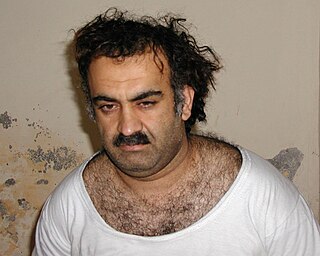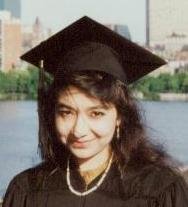Related Research Articles

Khalid Sheikh Mohammed, often known by his initials KSM, is a Pakistani terrorist, mechanical engineer and the former Head of Propaganda for al-Qaeda. He is currently held by the United States at the Guantanamo Bay detention camp under terrorism-related charges. He was named as "the principal architect of the 9/11 attacks" in the 2004 9/11 Commission Report.

Aafia Siddiqui is a Pakistani national who is serving an 86-year sentence at the Federal Medical Center, Carswell in Fort Worth, Texas, United States, for attempted murder and other felonies.
Adam Yahiye Gadahn was an American senior operative, cultural interpreter, spokesman and media advisor for the Islamist group al-Qaeda, as well as prolific noise musician. Beginning in 2004, he appeared in a number of videos produced by al-Qaeda as "Azzam the American". Gadahn, who converted to Islam in 1995 at a California mosque, was described as "homegrown," a term used by scholars and government officials for Western citizens "picking up the sword of the idea" to commit attacks in the West. American intelligence officials allege that he inspired the 2007 Osama bin Laden video.
Nazih Abdul-Hamed Nabih al-Ruqai'i, known by the alias Abu Anas al-Libi, was a Libyan under indictment in the United States for his part in the 1998 United States embassy bombings. He worked as a computer specialist for al-Qaeda. He was an ethnic Libyan, born in Tripoli.
Muhammad Naeem Noor Khan was an alleged Al-Qaeda operative and computer expert. Arrested in Pakistan on 13 July 2004, files found on his laptop contained details of a terrorist plot to attack U.S. financial buildings and locations in the UK, including Heathrow Airport.

Muhsin Musa Matwalli Atwah was an Egyptian national wanted by the United States government.

Abu Faraj al-Libi is an assumed name or nom de guerre of a Libyan alleged to be a senior member of the al-Qaeda terrorist organization. His real name is Mustafa Faraj Muhammad Muhammad Masud al-Jadid al-Uzaybi. He was arrested by Pakistan's Inter-Services Intelligence (ISI) on May 2, 2005, in Mardan. Finding al-Libi was a joint effort of the Central Intelligence Agency's (CIA) Special Activities Division and Pakistan's Special Forces.
Abu Musab al-Suri, born Mustafa bin Abd al-Qadir Setmariam Nasar, is a suspected Al-Qaeda member and writer best known for his 1,600-page book The Global Islamic Resistance Call. He is considered by many as 'the most articulate exponent of the modern jihad and its most sophisticated strategist'.
Sheikh Ahmed Salim Swedan was a fugitive wanted in the United States as a participant in the 1998 U.S. embassy bombings. He was alleged to have purchased the Toyota and Nissan trucks used in the attacks, flying out of Nairobi to Karachi, Pakistan five days before the assault was launched. Swedan was on the FBI Most Wanted Terrorists list since its inception in October 2001. He was born in Mombasa, Kenya.
Qari Saifullah Akhtar was an alleged member of Al-Qaeda who was in Pakistani custody a few times prior to his death. Akhtar, a graduate of Jamia Uloom-ul-Islamia in Karachi, had been the leader of Harkat-ul-Jihad-al-Islami (HUJI), a jihadi organization. He was a key figure and founder of HUJI and was involved in jihadi groups since the early 1980s. He was appointed the head of HUJI following the killing of Mawlana Irshad Ahmed at Sharana during clashes with Soviet forces in June 1985. He was reportedly involved in the 1995 coup attempt to topple the Pakistani government led by Benazir Bhutto. When HUJI merged with Harkat-ul-Mujahideen (HUM) around 1990 to form Harkat-ul-Ansar (HUA), Akhtar acted as deputy to former HUM leader and then amir Maulana Fazalur Rehman Khalil. HUA splintered into two separate groups in 1997, allowing Akhtar to become amir of HUJI. Since 1998 when Osama bin Laden released a fatwa under the banner World Islamic Front for Jihad Against the Jews and Crusaders, segments of HUJI have joined al-Qaeda. It has been reported that Akhtar was running a training camp at Rishkhor, Afghanistan before the US invaded Afghanistan in 2001, and had trained 3,500 persons in conventional and unconventional combat. He disappeared from Afghanistan but was apprehended in August 2004 in the United Arab Emirates. He was then handed over to Pakistan.
The American intelligence analysts who compiled the justifications for continuing to detain the captives taken in the "war on terror" made dozens of references to al Qaida safe houses, in Karachi, Pakistan.
Riyadh, alternately Riad, alternately Riyadh the facilitator, is a pseudonym that was given to a number of individuals who were suspected to be member of al-Qaeda. American intelligence officials and the press used the pseudonym for at least two individuals.
Mustafa Ahmed Muhammad Uthman Abu al-Yazid, better known as Saeed al-Masri or simply al-Masri, was an Egyptian who was alleged to have acted as the financial chief for al-Qaeda. Along with Mahfouz Ould al-Walid and Saif al-Adel, al-Masri was believed to have opposed the September 11 attacks two months prior to their execution. He was killed in a targeted killing drone airstrike in Pakistan on May 21, 2010.
Saud Memon was a Pakistani businessman from Karachi dealing in yarn and textiles. Memon was said to own the Al-Qaeda safe house in Karachi where American journalist Daniel Pearl was killed. Memon was wanted by law-enforcement agencies in the Pearl case for supposedly providing the place where Pearl was beheaded and subsequently buried. However, Memon was never formally charged.
Hassan Ghul, born Mustafa Hajji Muhammad Khan, was a Saudi-born Pakistani member of al-Qaeda who revealed the kunya of Osama bin Laden's messenger, which eventually led to Operation Neptune Spear and the death of Osama Bin Laden. Ghul was an ethnic Pashtun whose family was from Waziristan. He was designated by the Al-Qaida and Taliban Sanctions Committee of the Security Council in 2012.

Abu al-Layth Ali Ammar Ashur al-Libi was a Libyan militant who was a leader of al-Qaeda in Afghanistan who appeared in several al-Qaeda videos. He was believed to have been active in the tribal regions of Waziristan. He also served as an al Qaeda spokesman. According to the Defense Intelligence Agency, he was an "expert in guerilla warfare."

The Pakistani Taliban, formally called the Tehreek-e-Taliban-e-Pakistan, is an umbrella organization of various Islamist armed militant groups operating along the Afghan–Pakistani border. Formed in 2007 by Baitullah Mehsud, its current leader is Noor Wali Mehsud, who has publicly pledged allegiance to the Afghan Taliban. The Pakistani Taliban share a common ideology with the Afghan Taliban and have assisted them in the 2001–2021 war, but the two groups have separate operation and command structures.
Arshad Khan, commonly known as Abu Ahmed al-Kuwaiti was a Kuwaiti-born Pakistani courier for Osama bin Laden.
Ansarul Sharia Pakistan (ASP) is a Pakistani Alleged Al-Qaeda linked militant group based in Karachi, Pakistan. The organization was founded in February 2017. The group was known for committing many attacks, at one point they performed attacks on a weekly basis. The group claimed, through their Twitter page, that they recruited members from South Punjab, Balochistan, and Waziristan. The group has also claimed to have ties to Al-Qaeda.
References
- ↑ King, Laura; Rodriguez, Alex (19 February 2010). "Afghan Taliban 'shadow governor' is captured in Pakistan". Los Angeles Times . Retrieved 9 April 2021.
- ↑ "DAWN.COM | Metropolitan | Three Al-Qaeda associates arrested in Karachi". Archived from the original on 2010-02-21. Retrieved 2010-03-01.